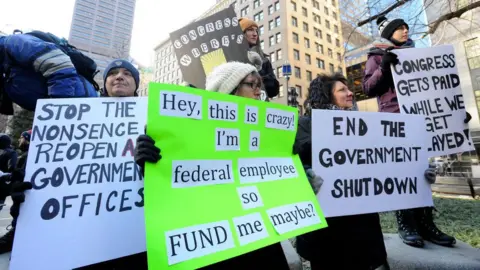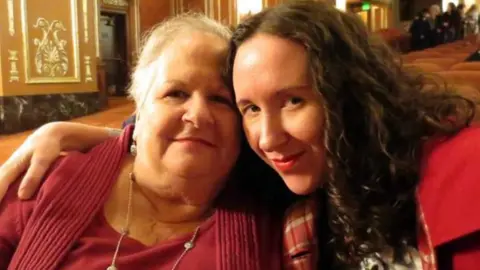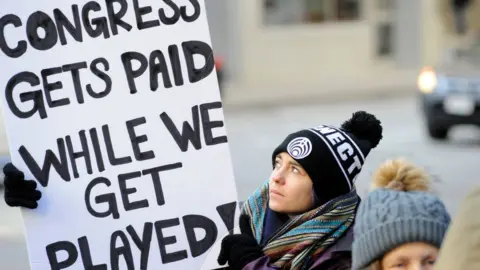US government shutdown: 'I can't get my meds because of Trump'
 Getty Images
Getty Images"Now that I have nothing to help me stabilise my mood, I'm just very worried that I'm going to start having more bad days than good days."
Jazz Sexton works for the US government - or at least did until just before Christmas.
She's not been to work since 21 December and is running out of money, which means she's been unable to renew her anti-depressants prescription.
Since then the US government has been partially shut down, with President Donald Trump refusing to approve a budget unless it includes $5.7bn (£4.43bn) to fund a wall on the border with Mexico - something the opposition Democratic Party has rejected.
"I thought for sure it could not last more than two weeks," Jazz, who works as a trainee for the Internal Revenue Service (IRS), told Radio 1 Newsbeat.
"Everyone who I was in training with, we were a little excited at the prospect of having a few days off with a shutdown because Christmas was on a Tuesday, so we had Monday and Tuesday off and we thought well, if there's a shutdown for the rest of the week for Christmas, that's OK.
 Jazz Sexton
Jazz Sexton"Obviously now I was a little naive in that because we're in our fourth week. And it's been very difficult."
The shutdown, which Jazz says she blames on President Trump and "racist rhetoric in the US", has affected about a quarter of the federal government - meaning 800,000 employees haven't been paid.
Jazz joined the IRS in October and didn't have any savings from her previous job. She says that with no end to the shutdown in sight, she's down to her last couple of hundred dollars - which is needed to help out with rent.
And because she joined so recently, her healthcare hadn't been properly processed before the shutdown.
"So I haven't been able to renew my prescriptions for my medication that I've been on for the last few years," Jazz says.
"I've had to wean myself off 40mg tablets, down to 20mgs and then down to 10mgs. And yesterday was my very last day - I don't have any more."
 Jazz Sexton
Jazz SextonJazz says the anti-depressants she needs cost anywhere between $900 and $1000 (between £700 and £800) for between 30 and 90 days of medication - money she simply doesn't have.
"It means I just can't predict how I'm going to feel from day to day. I'm having a pretty good day today, I feel like everything's alright today.
"A couple days ago I felt like I just wanted to go to sleep and not wake up again. I felt like all of my choices that I've ever made in life were just terrible choices and that I'm bad at being a person."
The stress of not knowing when she'll be able to go back to work isn't helping, but Jazz is doing what she can to help her mental health - going on walks, exercising.
She's also used some of the time off to apply for other jobs.
"When I started this job with the IRS, I felt that this was my pathway to financial stability, finally. Obviously at this moment it is not that.
"I'd like to stay with the IRS, but if this is going to go on as President Trump said for months, or even years, I have no idea at this point. So I'm looking into finding that financial stability that I need."
 Jazz Sexton
Jazz SextonTimothy Nicholson is an economist at the Environment Protection Agency (EPA).
And despite not being paid since 28 December, he insists he's "one of the lucky ones".
"I don't have a family to take care of or any kids so I was able to save enough money to hopefully get through the next few months."
His friends weren't quite so fortunate though.
"I didn't buy very many Christmas gifts. It sort of seemed like a shutdown was in the works for a little while, so I definitely cut back on my spending quite a bit from then until now."
The 26-year-old says he's been reducing the amount of money he pays back on his student loans over the past year so that he could save for a potential emergency like this.
But even that might not be enough.
"Right now I'm OK but if this goes on for much longer, I'm going to start panicking."
 Getty Images
Getty ImagesBoth Jazz and Timothy stressed that while things can seem pretty bad for them, it's worse for other people.
"Most government employees don't get paid all that much to begin with so it's definitely pretty tough for others," Timothy says.
"I've seen a few new food banks temporarily open here in DC.
"One particular chef, Jose Andres, has been great in terms of making sure that workers who are downtown are able to get free lunches - and he's also opening a new food kitchen for government workers on Wednesday here, which is very nice of him."
Jazz is worried that if the government shutdown rolls on into February, it will start to seriously affect people who rely on state benefits.
"Some people rely on welfare completely for their income. That goes towards food, and if they don't have that the food banks might be overflowing with people, and it's just a huge strain on the resources for everyone in the country."
What happens next?
Government shutdowns aren't all that unusual, but this one is now the longest in US history - and it doesn't look like either side is ready to budge.
There has been speculation that President Trump could declare a state of emergency in order to bypass Congress and get the money he wants for his wall.
He called that the "easy way out" though, saying he'd prefer Congress to solve the problem.
"If they can't do it... I will declare a national emergency. I have the absolute right," he added.
For Jazz, an end to the shutdown would mean not only job stability but stability in terms of health too.
"If the shutdown were to end, the federal government would be able to process my health insurance application as a new hire for the IRS and I would be able to renew my prescriptions and continue to be a healthy individual."
Listen to Newsbeat live at 12:45 and 17:45 every weekday on BBC Radio 1 and 1Xtra - if you miss us you can listen back here.
